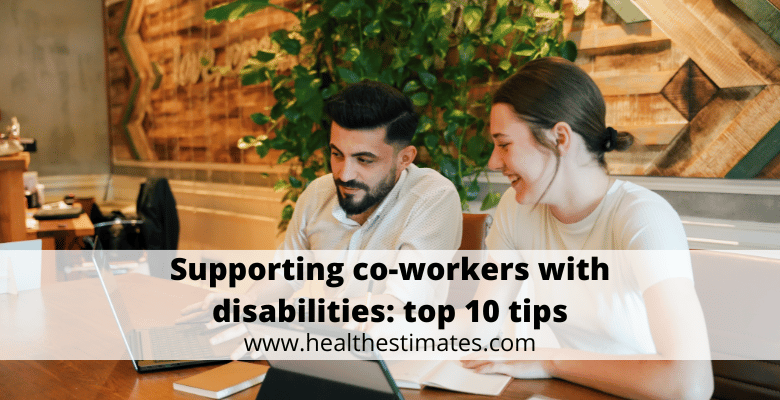
Supporting Co-Workers With Disabilities
If you don’t have a disability, it’s likely that you know someone who does. In the United States, there are 61 million adults living with a disability – that’s 1 in 4 adults nationwide. Unfortunately, however, many people with disabilities face a myriad of challenges in the workplace, including discrimination, stigmatization and a lack of accommodation. Even people with the best intentions can sometimes unknowingly cause harm, which can be upsetting for both them and the person with a disability.
As an employee benefits company, we have insider knowledge of this challenge. In this guide, we’ll be discussing ten things to keep in mind when supporting your co-workers with disabilities.
1) Be Compassionate
Disabilities can come in many forms, and it’s unlikely that you’ll be able to recognise every individual in your workplace who has a disability of some kind.
Just remember: Not all disabilities are visible.
Some individuals may have a disability that isn’t obvious, but this doesn’t mean that it doesn’t exist. There are a huge number of reasons why somebody might not advertize the fact they have a disability, but this isn’t for you to judge. When supporting your co-workers, the number one thing to do is be compassionate – everyone is fighting their own battles, so acting with empathy and compassion is a sure-fire way to support them day in, day out.
2) Understand Their Specific Needs
Every disability is different, so when you’re trying to support your co-workers, one of the first steps you should take is to understand what their specific needs are. For example, people with neurological conditions like autism may prefer any communication to be sent online, rather than delivered face to face. On the other hand, people with a visual impairment might prefer in-person meetings to an email or online call.
By recognizing that disabilities aren’t ‘one size fits all,’ you can alter your behavior to the unique needs of your co-workers in a respectful and productive way.
3) Use Appropriate Terminology
One of the biggest issues faced by people with disabilities is the terminology and language that makes its way into workplaces around the country. When supporting your co-workers, the words you use play a key role in their comfort and safety. Some of the key points to remember when addressing people with a disability include:
- Avoid Negative Terms
Words that place a person’s disability in a negative light are harmful and act to further stigmatize them. Avoid suggesting that someone is ‘afflicted by’ or ‘suffers from’ their disability.
- Put The Person First
When speaking with, or about, people with disabilities, you should remember that they are a human being first and foremost. Don’t collectivize them into a group of ‘the disabled’ – if you need to refer to someone’s disability for any reason, you should do so after you refer to them by name first.
- Don’t Name-Call
While this should go without saying, there is unfortunately a huge number of people with disabilities who have faced derogatory name-calling at work directly related to their condition. Remember – it costs nothing to be a good person. Don’t name-call, and call out anyone in the workplace who feels the need to do so.
4) Don’t Patronize Anyone
A big part of being supportive and respectful of your co-workers with disabilities is ensuring that you never patronize them. Speaking to them as if they are a child, or giving sympathetic or pitying looks is thoughtless, and encourages a culture of disrespect in the workplace.
Even if a person is in a wheelchair or needs assistance to carry out some of their daily tasks, this doesn’t mean that they aren’t fully capable of doing their job – they should still be treated as an equal.
5) Offer A Helping Hand
Just like people without a disability, those who face additional challenges are best supported if you offer them a helping hand. From holding a door open a little longer to wait for somebody with mobility issues, to reading text aloud during a presentation to account for a person’s visual impairment, your options are limitless when it comes to helping others.
As long as you remember to ask a person with a disability whether they need help beforehand, to make sure that it isn’t unwanted, you can support your co-workers by simply reaching out in a kind, thoughtful manner.
6) Make Accommodations
As part of your role, you might need to make some accommodations in the workplace to support co-workers with disabilities, which may include:
- Adjustments to typical scheduling arrangements.
- Specialist or dedicated equipment like desks, chairs and monitors.
- Adaptations to the recruitment or promotion processes.
- Specialized training opportunities that cater to an individual’s unique needs.
7) Ask For Their Opinion
Many disabilities, especially those that are sometimes invisible, can make it difficult for people to speak up in social situations. In meetings, try to ask your co-workers with disabilities for their opinions and feedback, to encourage them to share their thoughts.
If you run online meetings, allow individuals to give their opinion through a range of channels, such as the chat function of group calls or by filling out an anonymous survey. This is a great way to drive communication with those who might struggle to keep up with the pace of spoken meetings or face hearing difficulties.
8) Act On Their Suggestions
An incredible 75% of employees with disabilities report having an idea that they feel could drive increased value for their company, yet often their voices unfortunately go unheard in the workplace due to outdated stereotypes or the inability of others to effectively communicate with them.
Once you’ve gathered the opinions or suggestions of your co-workers, acting on them and supporting their ideas is a fantastic way to show that you respect their time and commitment to the company, as well as see their value as a human being.
9) Offer Flexibility
If you work alongside a co-worker with a disability, or you act as their line manager, it’s important to offer flexibility in their working arrangements. Their disability may require frequent doctors’ appointments, or more days a week in which they work from home.
By supporting them to work at times and locations that work for them wherever possible, you can show your co-workers one of the best signs of support: trusting that they can perform their role without micromanagement.
10) Go The Extra Mile
Above all, when it comes to supporting your co-workers with disabilities, it’s crucial to go the extra mile. Doing everything you can to make daily tasks a little easier goes a long way, and for those who face challenges as a result of their condition, you can really make a difference to their lives by creating a secure, comfortable working environment.
Disability can affect anyone, at any time. Being prepared and understanding how to support your co-workers with disabilities is the best way to make sure you aren’t unknowingly causing harm to others – this allows everyone in the workplace to succeed and thrive together.





